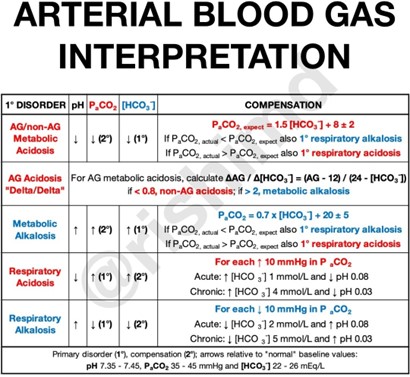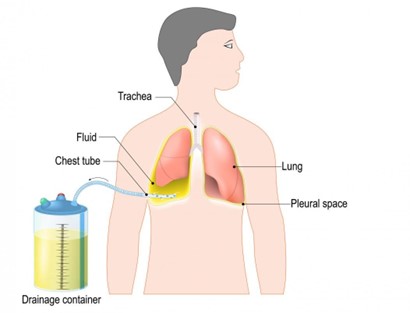The nurse is caring for a client with respiratory alkalosis. Which arterial blood gas data does the nurse anticipate finding?
pH-7.10. CO2-78. HCO3-25
pH-7.55. C02-20. HCO3-24
pH-7.25, CO2-64, HCO3-22
Ph-7.0. CO2-72. HCO3-26
The Correct Answer is B
Respiratory alkalosis is a condition in which the blood pH is elevated due to a decrease in the partial pressure of carbon dioxide (CO2) in the blood. This can occur when a person breathes too rapidly or deeply (hyperventilation), causing them to exhale too much CO2. In this option, the pH is elevated (normal range is 7.35-7.45), the CO2 is low (normal range is 35-45 mmHg), and the bicarbonate (HCO3) level is within the normal range (22-26 mEq/L), which are all consistent with respiratory alkalosis.

Nursing Test Bank
Naxlex Comprehensive Predictor Exams
Related Questions
Correct Answer is D
Explanation
Explanation: In clients with COPD, the secretions tend to be thick and sticky, which makes it difficult to cough up and clear the airway. To promote respiratory hygiene in this situation, the nurse should recommend increasing fluid intake. Adequate hydration helps to thin the secretions, making them easier to expectorate. The client should aim to drink at least 8-10 glasses of water or other fluids per day unless there is a medical reason not to do so.
Decreasing fluid intake (option a) would make the secretions even thicker and more difficult to clear. Taking Tylenol for secretions (option b) is not a recommended intervention as Tylenol is not indicated for thinning of secretions. Range-of-motion exercises (option c) are important to prevent complications such as pneumonia, but they are not directly related to promoting respiratory hygiene in this situation.
Correct Answer is C
Explanation
: Chest tube placement is done to remove air or fluid from the pleural space, which is the area between the lungs and the chest wall. The chest tube drainage system is an important tool to monitor and manage the drainage from the chest tube.
It is essential that the chest tube drainage system is placed below the level of the patient's chest and the site of insertion. This is necessary to create a continuous drainage system by allowing gravity to assist in the flow of air or fluid out of the pleural space. If the chest tube drainage system is placed above the insertion site, the fluid will not drain properly, which can cause the fluid to back up into the patient's chest cavity, leading to complications such as pneumothorax or hemothorax.
Therefore, the appropriate statement regarding a chest tube is that the chest tube drainage system must be placed below the site of insertion.

Whether you are a student looking to ace your exams or a practicing nurse seeking to enhance your expertise , our nursing education contents will empower you with the confidence and competence to make a difference in the lives of patients and become a respected leader in the healthcare field.
Visit Naxlex, invest in your future and unlock endless possibilities with our unparalleled nursing education contents today
Report Wrong Answer on the Current Question
Do you disagree with the answer? If yes, what is your expected answer? Explain.
Kindly be descriptive with the issue you are facing.
